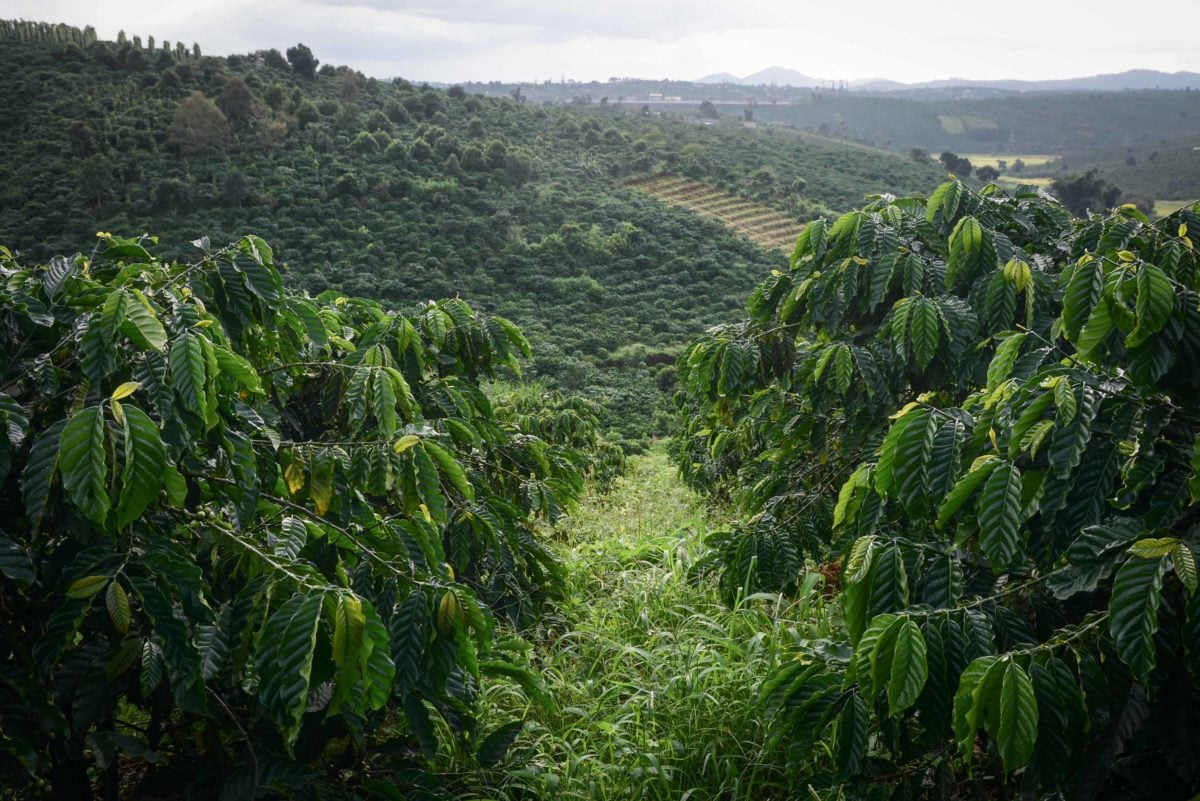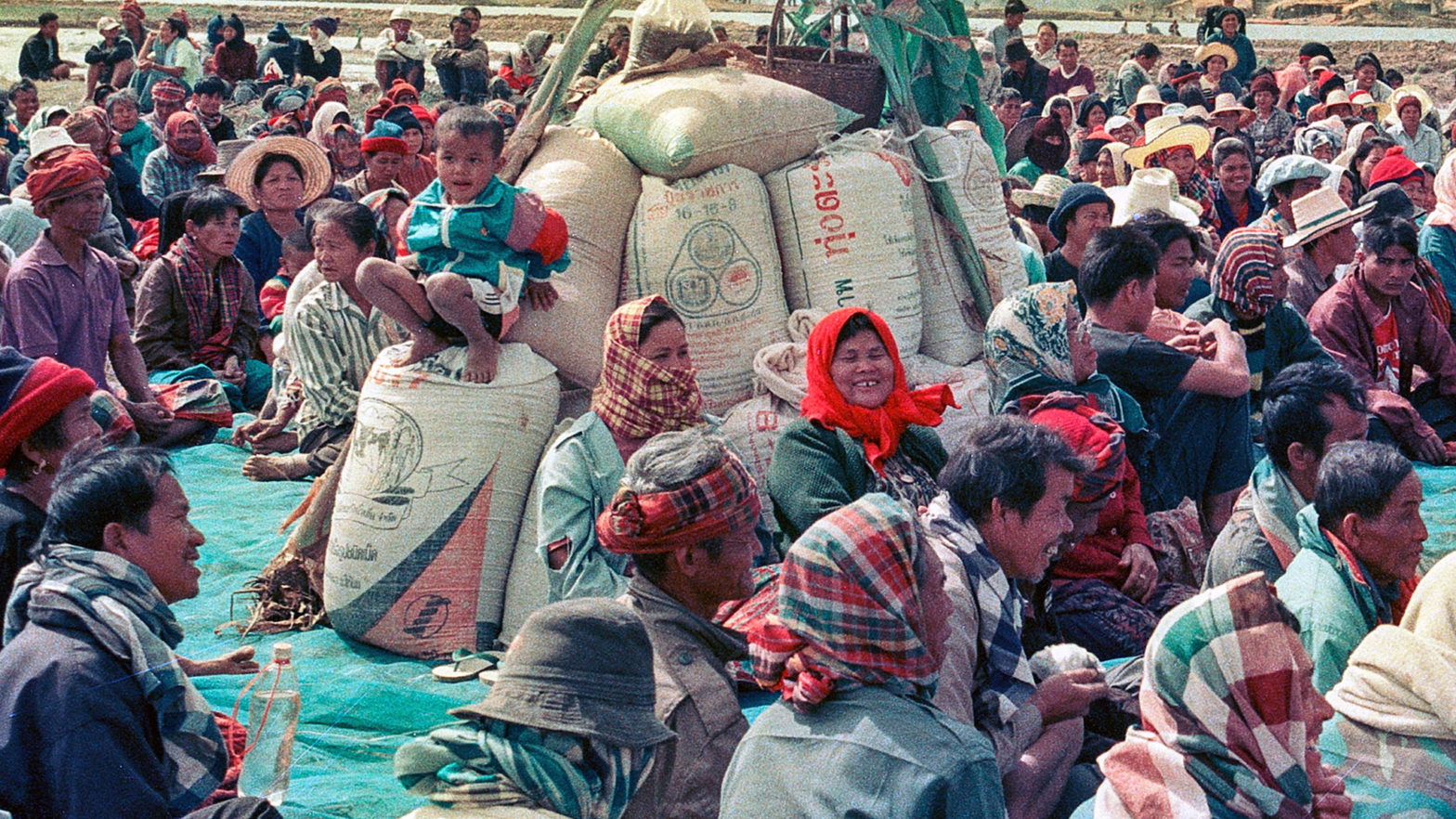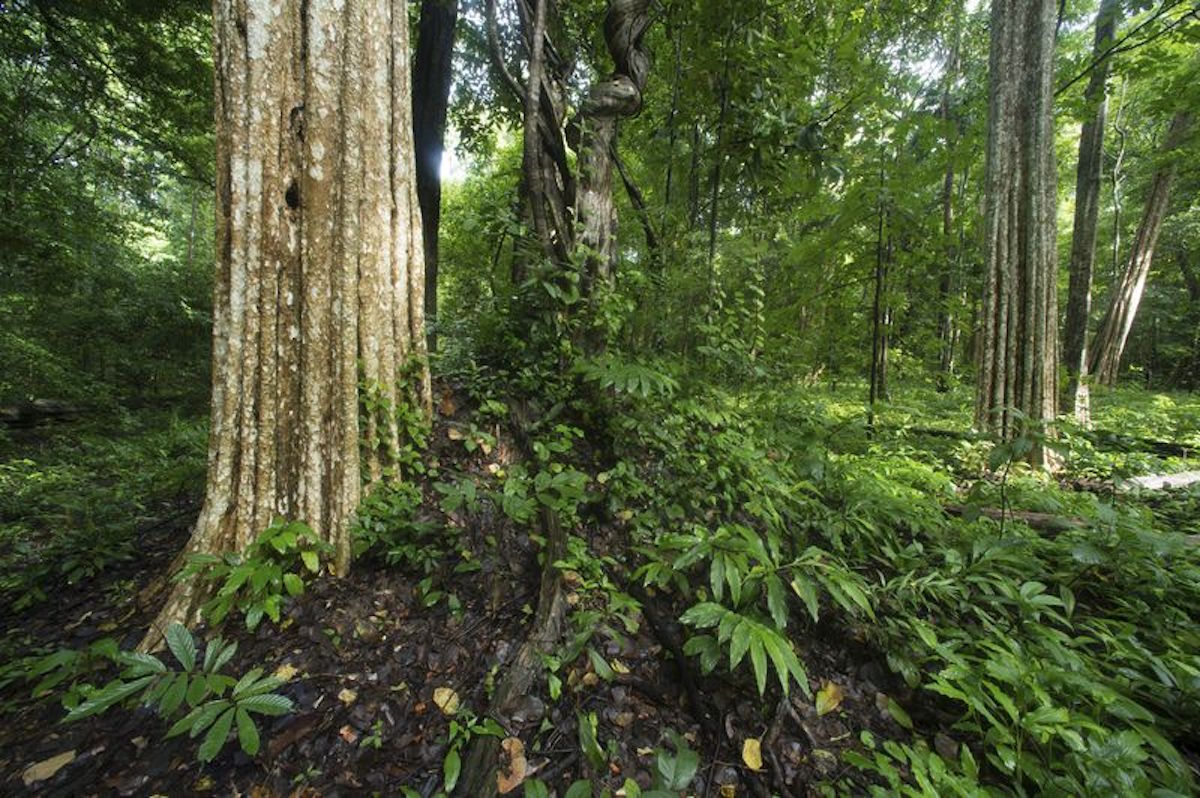At the end of 2019, after a long decade of price volatility and dwindling values, local media outlets in Vietnam were reporting an economic crisis for the coffee industry. This year was supposed to bring the long-awaited recovery everyone was hoping for but after months of global lockdowns and social distancing forcing millions of cafes to close, prices continued to plummet and show little sign of a recovery anytime soon.
Robusta accounts for around 97 percent of Vietnam’s coffee crop and makes up almost half of the world’s total supply. In April this year its global export price dipped to levels unseen since 2006 – not much higher that the domestic farm-gate values of US$1.30 per kilogram that most Vietnamese Robusta farmers currently receive. Farmers can barely cover running costs at this price, let alone make any profit, leaving the future of one of Vietnam’s largest industries and the livelihoods of millions in jeopardy.
To make matters worse, Vietnam’s coffee regions are set to bear the brunt of climate change and rising global temperatures. A report released earlier this year from the University of Southern Queensland (USQ), in conjunction with the DeRisk South East Asia project, revealed that the once aptly named Robusta is much less hardy and more vulnerable to warmer temperatures than previously thought, affecting yields and making them much more susceptible to disease.
In light of this bleak news, many are now considering whether the time for an inevitable transformation has arrived. Many already saw this coming and a discreet movement of smallholders, focused on improving the environmental and economic sustainability of Vietnam’s coffee industry, is already well underway.
Respect nature’s limits
Like many Vietnamese farmers, Du Lick Mul is worried for his family’s farm and the ability for future generations to continue and earn a decent living from growing coffee. As a proud member of the local K’ho ethnic group and with a degree in agroforestry, he has acknowledged an area of leverage that’s been ignored for too long. “We need to relearn our traditional values and revitalize a respect for natures’ sacredness we once had,” he says. In other words, to sustain the industry, he believes a move to more organic and ecologically sensitive ways of farming needs to take place.
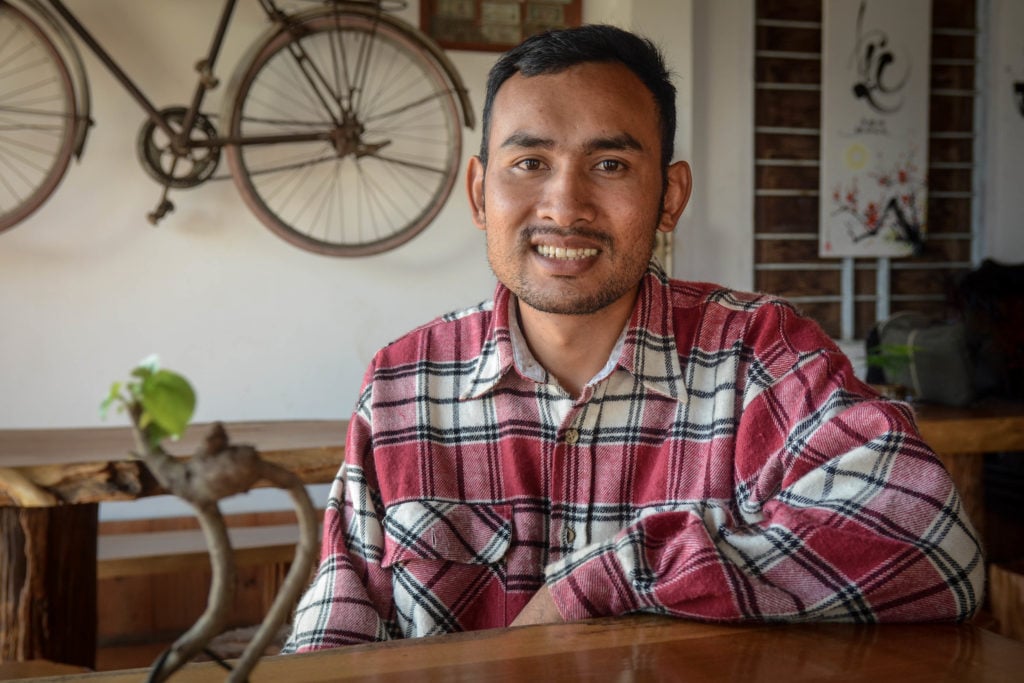
Young, innovative and capable farmers like Du Lick, are at the forefront of change in Vietnam’s coffee landscape. (Photo: Mark Ratcliff)
Du Lick says that almost all farmers in the region don’t really know much about chemicals and just assume that more is better. “The benefits of caring for the environment are rarely considered these days and the focus is almost always on higher yields and immediate profit,” he says. Recent studies have reinforced that there is no long-term correlation in the relationship between high fertilizer rates and bigger yields. On the contrary, overuse only speeds up the depletion of the soil fertility and increases the need for larger quantities which continues to minimize profit margins.
The overuse of chemicals by Vietnamese coffee farmers continues for several reasons, chief among them, however, is the heavily subsidized fertilizer price. This reinforces farmers’ habits to use as much fertilizer as they can afford, despite the long term damage caused. Considering the current value, there’s no better time than now to make the switch to more sustainable farming methods, says Du Lick.
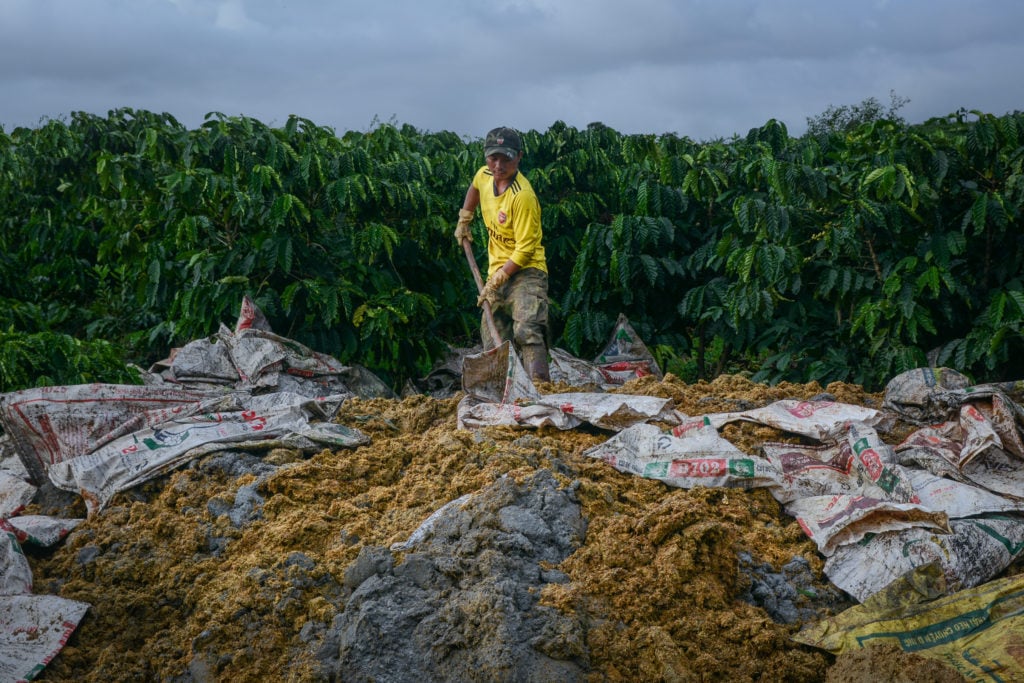
The overuse of fertilizers is prevalent in the coffee industry though economics is now forcing many to consider alternatives. (Photo: Mark Ratcliff)
To advance more ecological and environmentally responsible farming to his community, Du Lick uses a small plot to demonstrate his ideas that have evolved from his growing knowledge of agroforestry and years of experience working coffee fields near his village.
His small closed-loop farming system incorporates intercropping and the reuse of waste bean pulp and parchment as organic fertilizer – practices that used to be prevalent across Vietnam’s rural landscape but have gradually disappeared. Despite his qualifications and longer-term foresight, he says it’s a constant struggle to convince the wider community to give up chemicals and to accept that they need to look back and learn from their forebears as an effective way to move forward.
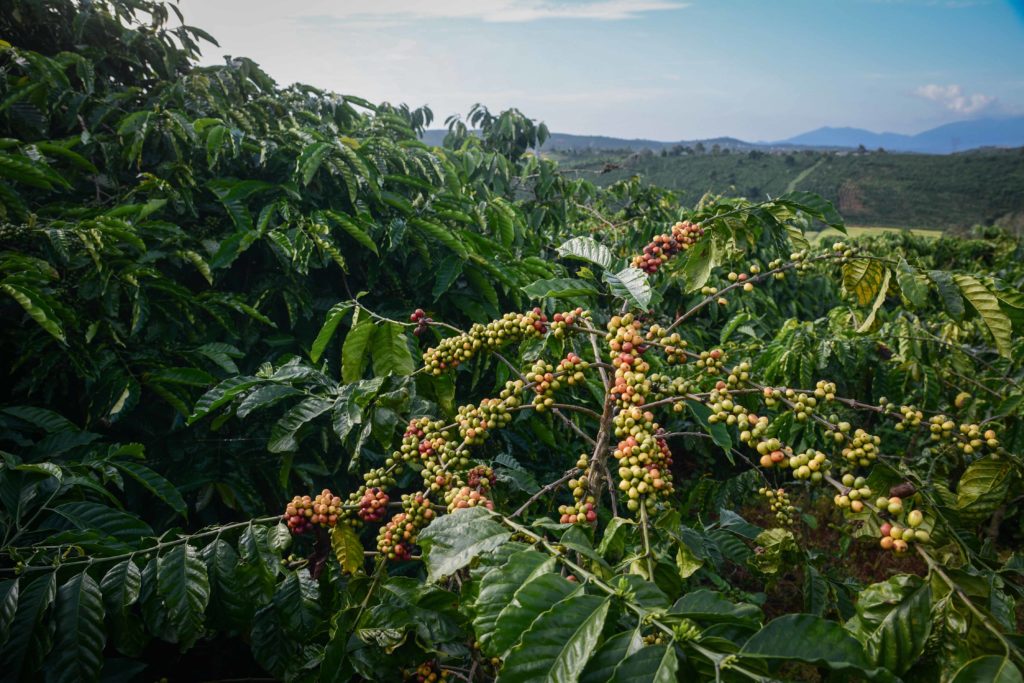
Coffee fields dominate the rolling hills of Lam Dong Province and a central pillar in the livelihoods of the regions farmers. (Photo: Mark Ratcliff)
Reluctance among smallholders is not universal, however, and there is a changing mindset developing at the top. According to the Ministry of Agriculture and Rural Development (MARD), Vietnam has plans to be one of the world’s top organic producers by 2030, even though less than 1 percent of current farmland meets organic certification criteria. To achieve this ambitious goal, between 7-10 percent of arable land will need to be utilized – and smallholders will need to accelerate their uptake of alternative practices.
Du Lick’s goal is to enhance this movement and support more of his peers to move to fully organic processes to protect the local environment, produce a higher standard Robusta bean, and a more reliable income for his community. Such behavioral change will take time, but the increasingly challenging markets farmers now face provide greater incentives for them to embrace new practices.
Quality is the way to find new markets
Robusta is relatively easy to grow and produces high yields, however, it’s much bitterer and sharper flavor means it’s much less favorable, especially when compared to the smoother and more universally popular Arabica. However, there is emerging evidence that this perception can be changed and higher prices possible, most notably, by improving the bean’s notoriously poor processing methods commonly used in Vietnam.
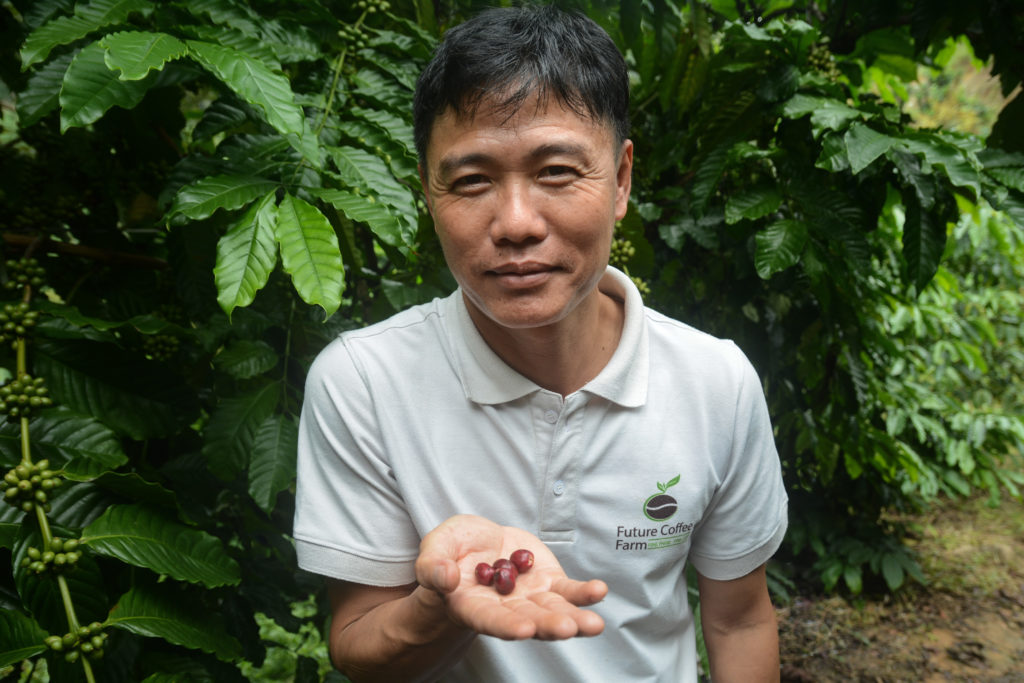
Future Farm Coffee believes that improving the harvesting and processing methods will have the biggest impact on sustaining Vietnam’s coffee industry. (Photo: Mark Ratcliff)
Future Farm Coffee, a cooperative based in Bao Loc, Lam Dong Province, is working tirelessly to enhance the quality and values of their Robusta and bolster Vietnamese coffee’s desirability across the globe. Toi Nguyen, the CEO of Future Farm Coffee, says that their approach to business has meant they’ve been “completely unaffected from the previous years of market volatility and the recent slump.” As long as they can continue to absorb its contracted supply, they can assure their farmers get paid the agreed amount.
Rather than selling their unroasted green beans on the commodity market, Future Farm trades directly with their customers. The only way to do this, says Toi, is to ensure a consistent and superior product. This begins with higher standards during the harvest and post-harvest processes. Unlike most smallholders, Future Farm only collects ripe beans, and once picked the beans are quickly moved to dedicated greenhouses to ensure a regulated environment for faster and reliable drying.
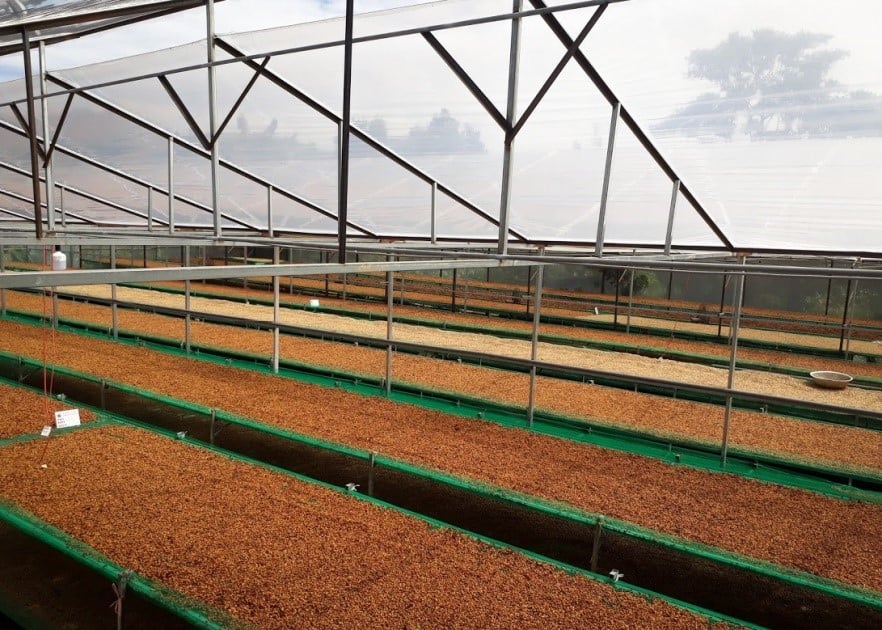
Greenhouses mean that the drying process is can be controlled and reduce fungus and spoilage. (Photo: Future Farm Coffee)
Most smallholders are unable to access such facilities and instead dry their beans in the open air, exposed to unforeseeable elements. “By controlling and hastening the drying process,” says Toi, “we can reduce spoilage and mold from growing, and preserve a full-bodied and pure flavor from our Robusta.” By ensuring a superior product they can demand much higher prices from customers.
At a time when most independent coffee farmers are struggling to earn a living, Future Farms’ partners – comprising 10 farms over 42 hectares – have been able to secure higher and more reliable incomes. Contracts fluctuate, with prices verying anywhere between US$3.50 and up to US$6.50 per kilogram, meaning that depending on demand, farmers can sometimes earn more than four times the current wholesale value.
The Vietnamese market is oversupplied with low value coffee, says Toi, and although Future Farm has a steady demand from numerous local cafés and roasters, it’s much more difficult to expand domestically. Instead, they focus on expanding globally, into markets in Japan, Germany, Belgium and the US where they’ve found a growing demand for Robusta’s stronger flavors.
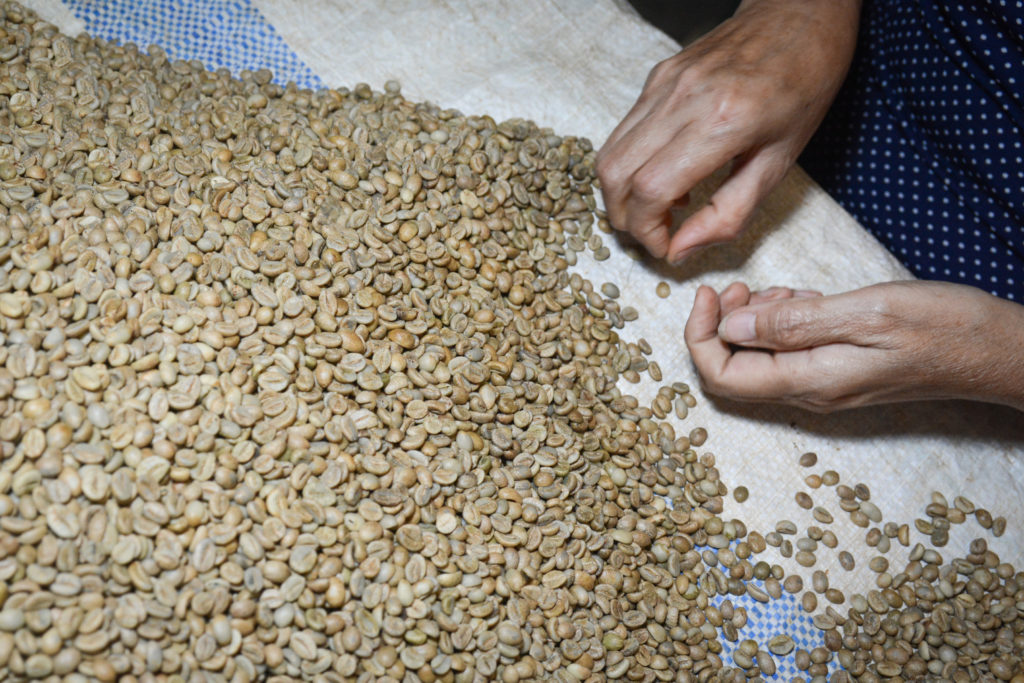
A regulated drying process ensures less spoilage but doesn’t negate the laborious task of individually removing the substandard beans. (Photo: Mark Ratcliff)
This year’s pandemic hasn’t affected their business but it has halted plans to travel to Europe and have vital face-to-face meetings with new and potential customers. Over the next few years, in addition to continuing to expand their global supply network, they also plan to begin a move away from reliance on biochemical fertilizers – in part, driven by demand from these foreign markets. This evolution will take time though, as one of their biggest challenges at the moment is maintaining quality.
To be accepted as a member in Future Farm Coffee, smallholders must demonstrate they can meet strict prerequisites in their farm’s general condition, their practices and the quality of their final product at the time of harvest. Because of these stringent requirements, most applicants are refused, despite their eagerness to join.
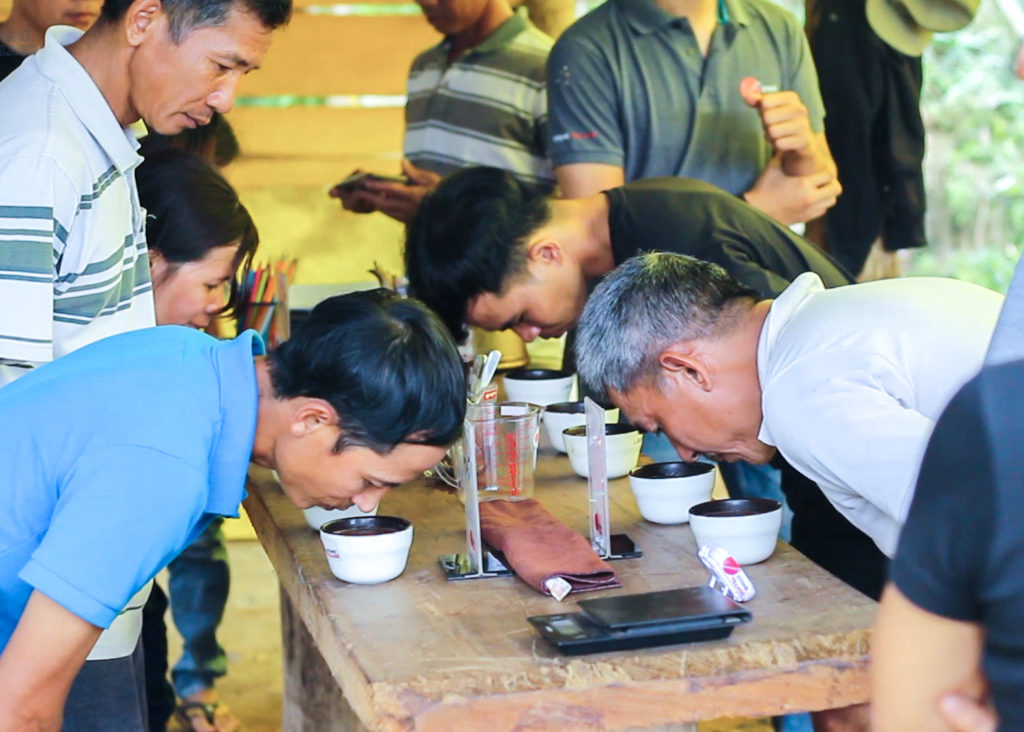
Future Farm provides training for farmers to learn about farming techniques and to understand the benefits of quality coffee product – a rarity for many Vietnamese smallholders. (Photo: Future Farm Coffee)
To support their current team and ensure quality is maintained, Future Farm holds regular farm inspections and training sessions to develop farmers’ understanding of processes as well as the final product. Toi has realized that “farmers are much more willing to put in extra effort once they’ve had a chance to experince the difference” between regular and quality Robusta.
Being part of such a community with other farmers means they get to experience change together while working toward shared goals. This also means they get access to a vital network to share techniques and stories, helping members avoid mistakes and bolstering innovation.
Strengthening Vietnam’s innovation and adaptability
Dr. Kien Van Nguyen, the founder of Mekong Organics, an Australian-based organization working to facilitate more knowledge-based systems across Vietnam’s agricultural landscape, confirms the need for a support network to offer insight and guidance and the vital role they play in ensuring sustainability and successful change.
“There’s no one single solution to sustainability,” he says, “but it must always involve a willingness to learn, innovate and take risks.” In his experience, as an ecology educator and change facilitator, the most successful farmers are always those who can learn from mistakes – be it their own or others’ – and be able to adapt quickly.
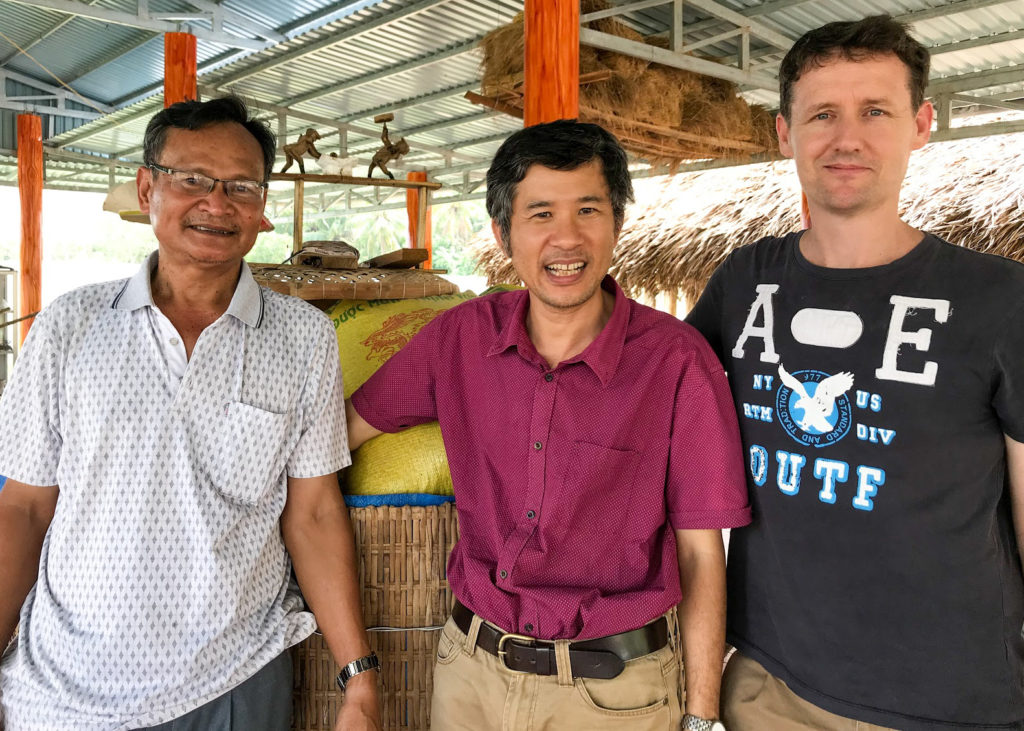
The founder of Mekong Organics, Dr. Kien Van Nguyen (center), is pictured with partners involved in a program focused on the conservation of traditional farming methods on the Mekong Delta. (Photo: Mekong Organics)
Dr. Kien says that while “Vietnamese farmers are highly skilled and able to quickly scale up production, they usually need help when switching to alternative methods of farming and doing business,” mainly due to a lack of knowledge and skills. His organization offers guidance to smallholders who want to switch to ecological and organic farming methods, connecting them with international organizations and alternative markets that help them develop their knowledge. They can then share this valuable insight within their local community, aiding them to make better-informed long-term decisions.
Mekong Organics has been operating for almost twenty years in Vietnam, though they have only started exploring coffee farming since 2019. The basic principles of behavioral change remain the same, however. Kien notes that despite the habits of many farmers, “the intensification of coffee production and the inevitable increases in input costs actually decreases profits.”
It’s often hard to recognize this anomaly with the constantly-changing natural and economic parameters. The most important thing though, he says, is that each individual farmer can recognize when things are not working and be willing to innovate, act quickly, and adapt to new processes. It’s important to remember that there is no best technique or single solution – every location and ecosystem has its own unique challenges and solutions.
Mekong Organics is just one of a growing number of organizations and individuals working on ways to protect the environment and strengthen the skills and knowledge of Vietnamese farmers. It remains to be seen how widespread or rapid this culture shift will spread, but one thing is for certain – for the future of Vietnam’s prevalent and vital coffee industry, the emergence of such a sustainability-driven movement could not be coming at a better time.


